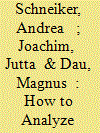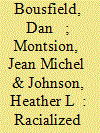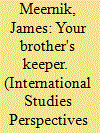|
|
|
Sort Order |
|
|
|
Items / Page
|
|
|
|
|
|
|
| Srl | Item |
| 1 |
ID:
165253


|
|
|
|
|
| Summary/Abstract |
In the summer of 2015, large numbers of refugees and migrants arrived on the shores of the Aegean islands but the Greek government and international organizations were slow to respond. How did civil society actors coordinate their responses when national, regional, and global governance failed? This article begins by describing how civil society actors improvised their response through everyday coordination mechanisms defined as the informal processes for communication and decision making that make up the day-to-day action of implementation. Second, the article analyzes four examples of everyday coordination mechanisms: new technologies (like Facebook groups and Whatsapp chats), peer-to-peer refugee coordination, maps of services, and field-level working groups. Everyday coordination threatened state authority because it governed actors in a different way, created parallel systems, and sometimes promoted competing goals. The Greek government responded by institutionalizing, coopting, and cracking down on civil society actors helping refugees.
|
|
|
|
|
|
|
|
|
|
|
|
|
|
|
|
| 2 |
ID:
165256


|
|
|
|
|
| Summary/Abstract |
Social scientists and international relations scholars are increasingly analyzing data collected from Twitter or Facebook to examine political processes in which social media are used. The sheer amount of web 2.0 data and its heterogeneity (including text, photos, and videos), however, pose challenges which analysts frequently seek to overcome through a mixed method approach relying on both quantitative and qualitative methods. This article discusses the advantages and limits of using mixed methods for analyzing social media. We show how the shortcomings of quantitative methods such as sentiment analysis and data mining can be remediated by qualitative content methods in a study of the Twitter activity of private military and security companies (PMSCs).
|
|
|
|
|
|
|
|
|
|
|
|
|
|
|
|
| 3 |
ID:
165252


|
|
|
|
|
| Summary/Abstract |
Academic and policy debates on migration and refugee “crises” across the world have yet to engage fully with the importance of cross border population mobility for states' diplomatic strategies. This article sets forth the concept of “migration diplomacy” as an object of analysis for academics and practitioners alike, distinguishing it from other forms of migration-related policies and practices. It draws on realist approaches in international relations to identify how the interests and power of state actors are affected by their position in migration systems, namely the extent to which they are migration-sending, migration-receiving, or transit states. The article then discusses how migration issues connect with other areas of state interest and diplomacy, including security interests, economic interests and issues of identity, soft power, and public diplomacy. Finally, the article suggests the utility of applying a rationalist framework based on states' interests in absolute versus relative gains as a means of examining the bargaining strategies used by states in instances of migration diplomacy.
|
|
|
|
|
|
|
|
|
|
|
|
|
|
|
|
| 4 |
ID:
165255


|
|
|
|
|
| Summary/Abstract |
International relations (IR) is traditionally taught from a detached standpoint, as the international realm is conceptualized as distinct from normative, emotional, and embodied realities. We challenge this abstraction and focus on emotions to examine the intersection of race and international relations in how we teach and how students learn. Focusing on emotional labor, we maintain that students are taught and learn about the presence and absence of race in the discipline in specific ways. As teachers and affective leaders, we manage student emotions at the intersections of race and international relations, including when to make these feelings visible and how to connect them to racialized narratives. After a brief review of recent critical scholarship on race in the discipline, we present a conversation in which we highlight our own affective leadership, emotional labor, and pedagogical strategies in the international relations classroom, as they pertain to engaging with issues of race and racism.
|
|
|
|
|
|
|
|
|
|
|
|
|
|
|
|
| 5 |
ID:
165254


|
|
|
|
|
| Summary/Abstract |
States have long employed other actors, including other states and nonstate actors, as fighting forces to help them achieve the national security objectives that they are unwilling or incapable of realizing unilaterally. In the international courts in recent years, however, there has been the increasing willingness to hold individuals accountable for violations of international law committed by those forces to whom they are providing assistance. For example, the Special Court for Sierra Leone found President Charles Taylor of Liberia guilty of aiding and abetting forces in Sierra Leone that repeatedly violated international law and inflicted untold human suffering on the people of that country. After delineating the legal risks facing state leaders that provide support to third party actors, I delve into conflict data to determine just how widespread the problem is. I examine the frequency with which actors commit violations of international law, and in particular the targeting of innocent civilians, and the extent to which such forces are being assisted by external actors. I find that this problem is prevalent and that many major powers have provided assistance to allies that violate international law.
|
|
|
|
|
|
|
|
|
|
|
|
|
|
|
|
|
|
|
|
|